Skip Down To:
Udemy Alternative Marketplaces | Understanding Udemy Terms and Conditions | Sell on your own site vs. another marketplace | What Is Right For You?
Every Udemy course instructor who has been on the platform for more than a few months has had that sinking feeling - You know the one: looking at how much you are earning per student and realize that it's...a tiny fraction of the course price on average:
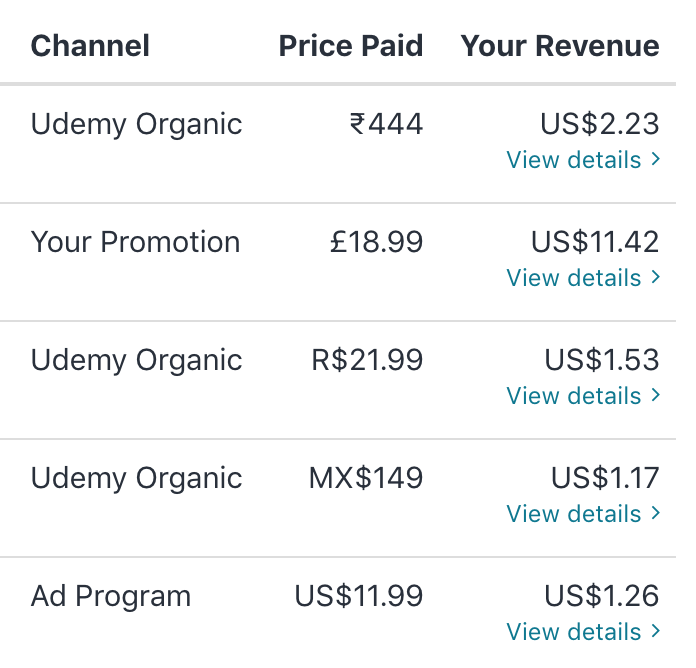
Seeing these kinds of numbers feels like a punch in the gut. You put all those hours into your course and that's all the cut you get?
Having said that, there's no denying that Udemy's status as an elearning marketplace offers value to course instructors and a convenient learning experience for students. There are millions of students on Udemy. Having access to a large pool of students can free up instructors from a lot of marketing work which can leave many instructors feeling like they have no choice but to stick to Udemy.
The good news is that there are many alternative marketplaces where you can sell your courses. In some cases, these can be in addition to or instead of Udemy. In this post, I will explain step-by-step the pros and cons to key online course marketplace alternatives.
- Part 1: Udemy Alternative Marketplaces
- Part 2: Understanding Udemy Terms and Conditions
- Part 3: Sell on your own site vs. another marketplace
- Part 4: What Is Right For You?
Udemy Alternatives - Marketplaces
There are hundreds of e-learning sites out there, and Udemy is clearly the king with some 50 million students as of 2020. Here we will talk about five significant Udemy alternatives for course authors.
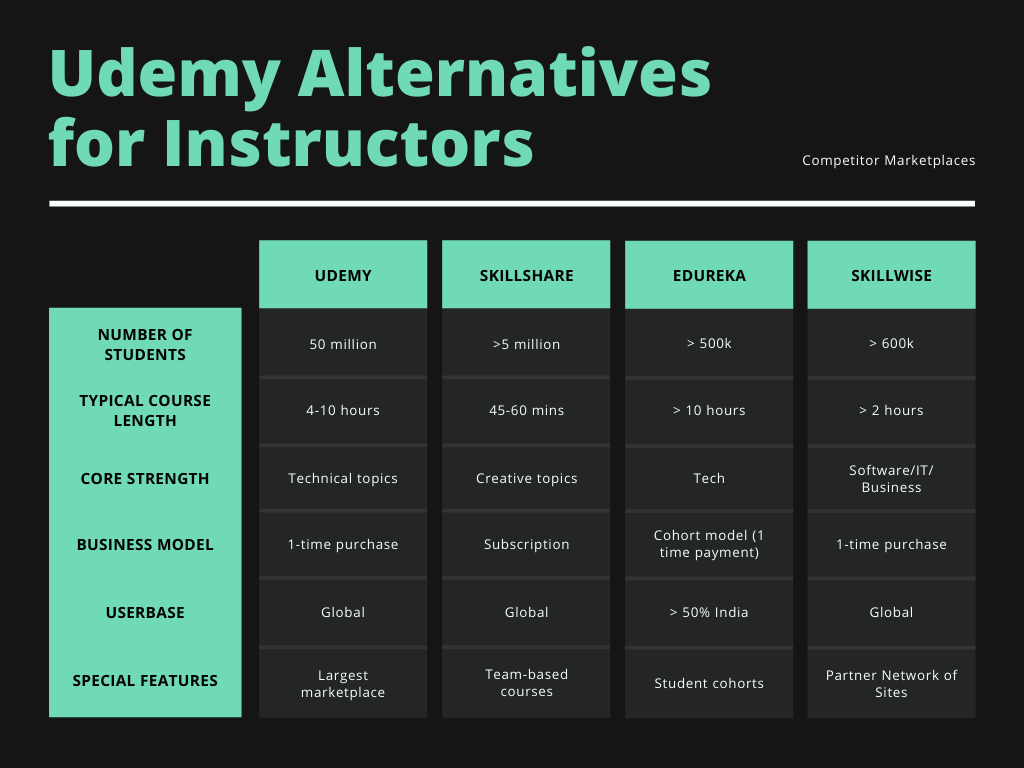
1. Skillshare
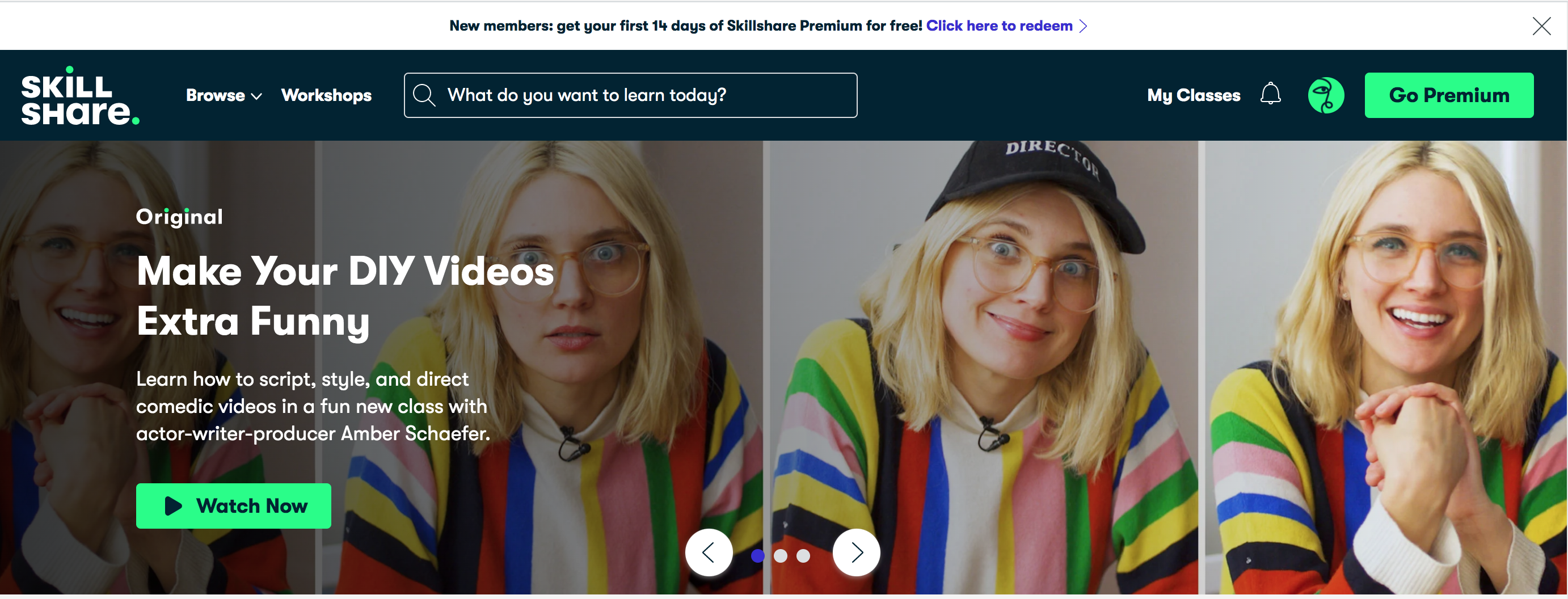
Alexa Global Traffic Rank: ~1,600
Skillshare is the largest Udemy alternative but has some important differences.
In 2018, when the platform closed its 28 million series C round of funding, it had over 5 million users
In 2019, during a Yahoo Finance interview, the Skillshare CEO Matt Cooper said the platform had
8 thousands teachers [...] and about 26000 classes
He also noted in the same interview that:
Skillshare does not cover coding [...] it's not our core competence
Skillshare focuses more on creative (but still practical) skills such as design, drawing, painting, photography, marketing, and animation. There is also a strong set of business courses. Crucially, Skillshare courses tend to be relatively short. This is likely to be due to the subscription business model (so students aren't gauging their "bang for the buck" on course length like they are on a site like Udemy). It does have some knock-on effects though since it means Skillshare courses tend to go into less depth than some of their longer Udemy equivalents.
Skillshare Course Instructor Payments
Skillshare costs students $15 per month for a subscription (or $99 billed annually). The consequence of the subscription business model for instructors is that they earn revenue through royalty payments. This means that teachers will receive payment based on the number of minutes of their class watched by Skillshare's paying students.
Each month, 30% of Skillshare’s total Premium Membership revenue goes to a royalty pool for teachers. [...] Teachers are paid from the royalty pool based on their share of the minutes watched by Premium students (both paying members and those in free trials) across the platform each month
Source: Skillshare teacher's handbook
What appeals to me about this business model is that teachers are rewarded for creating materials that keep students engaged.
Due to its subscription model, instructors used to Udemy's marketing tools (such as coupons) may find themselves feeling more limited, Skillshare offers $10 for every new student who signs up through your referral link.
2. Skillwise

Alexa Traffic Rank: ~15000 (average across partner sites)
Skillwise is part of the Stack Commerce umbrella. It is not to be confused with the BBC's skillwise website.
Confusingly you apply to be an instructor via the Stack Commerce form
To become a course author you simply apply, there are limited barriers to entry. Skillwise boasts >600,000 students on its platform.
One important point to note, however, is that the course content on the platform is limited to the following broad areas:
- Software Development
- Design
- IT + Security
- Business
- Photography
Skillwise Instructor Payments
For courses sold organically on StackCommerce sites (such as Skillwise, stackskills, and stacksocial) then you get 50%: As per the instructor terms and conditions
Instructors will earn an Instructor Revenue Share for any Course sold on StackCommerce's Direct Sites of fifty percent (50%)
For sites sold through "partner" sites, you get 20%:
When a Partner Site sells Your Course, Your Instructor Revenue Share will be adjusted to twenty percent (20%) of the Net Sale Amount
And similar to Udemy (although actually worse for instructors), if a course is sold as a result of paid ads (e.g. Google AdWords / Facebook Ads) then they take a whopping 90%:
"Paid Advertising." Instructor Revenue Share will be adjusted to ten percent (10%)
3. Edureka
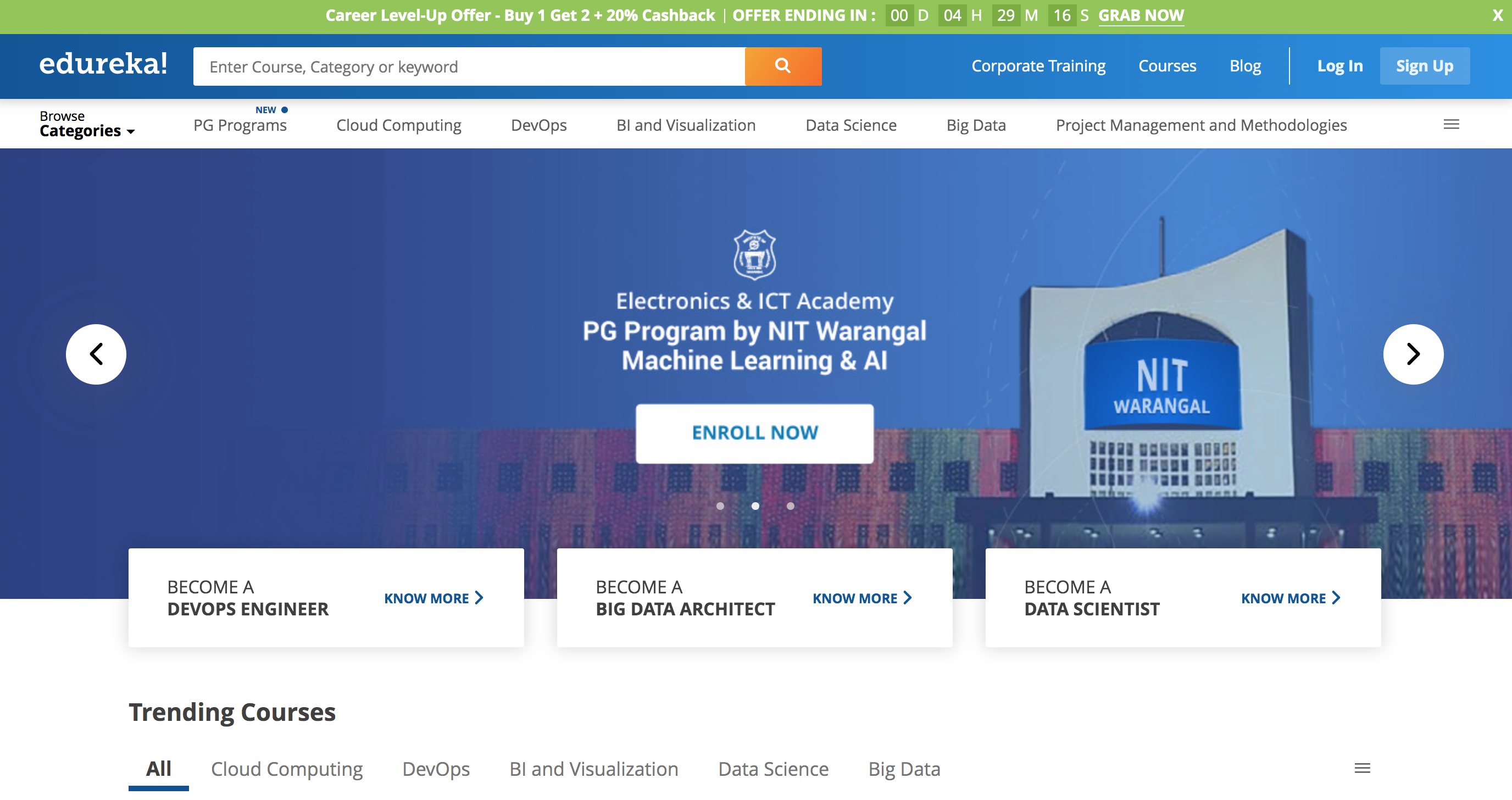
Alex Global Traffic Ranking: ~3,200
Edureka has rapidly grown in recent years. Whilst it still has more than 50% of its traffic from India, it is growing internationally.
Becoming an instructor involves filling in a form and then undergoing training based on "Edureka's Learning Methodology"
Anyone who has an in-depth working knowledge of the particular domain and is very passionate about teaching and sharing his/her expert knowledge with students and professionals can teach at Edureka. Good oral communication skills are mandatory.
The model of delivery for Edureka is a little different from the other marketplaces here, as students have the option to go into timed cohorts (similar to online classes or training courses). The idea is that Edureka puts students into these batches in order to improve the usually pretty-poor online course completion rates.
Edureka Instructor Payments
Edureka negotiates separate payment agreements with different course instructors which may work for or against you depending on factors such as your experience, location, and reputation.
4. Skills Success
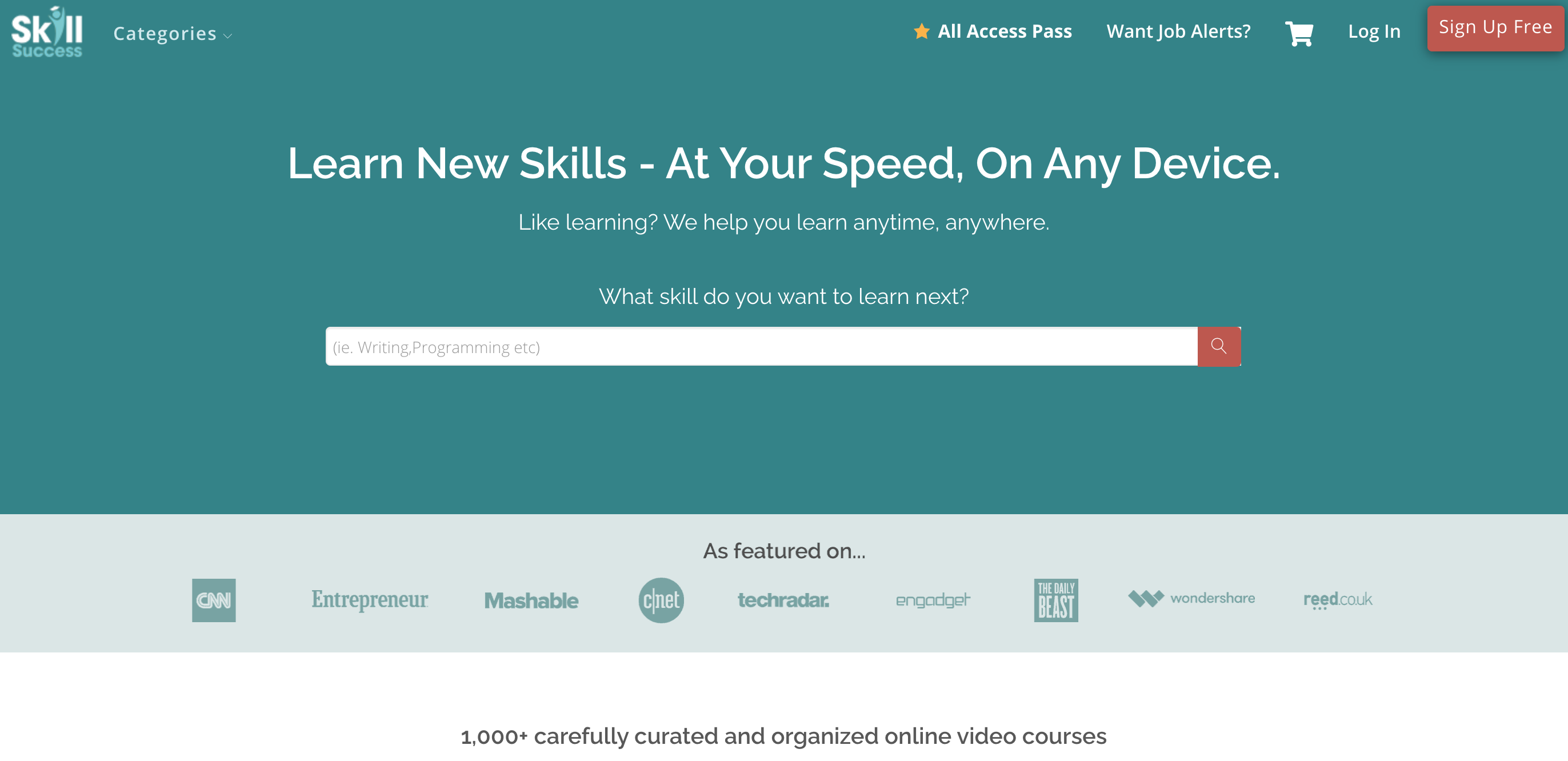
Alexa Global Traffic Ranking: 81,935 Course creators might also want to consider Skills Success
The process here is to provide a link to the course (easy to do if you're already on Udemy, for new authors I guess you provide a link to the videos). They then get back to you within 3 days.
5. Coggno
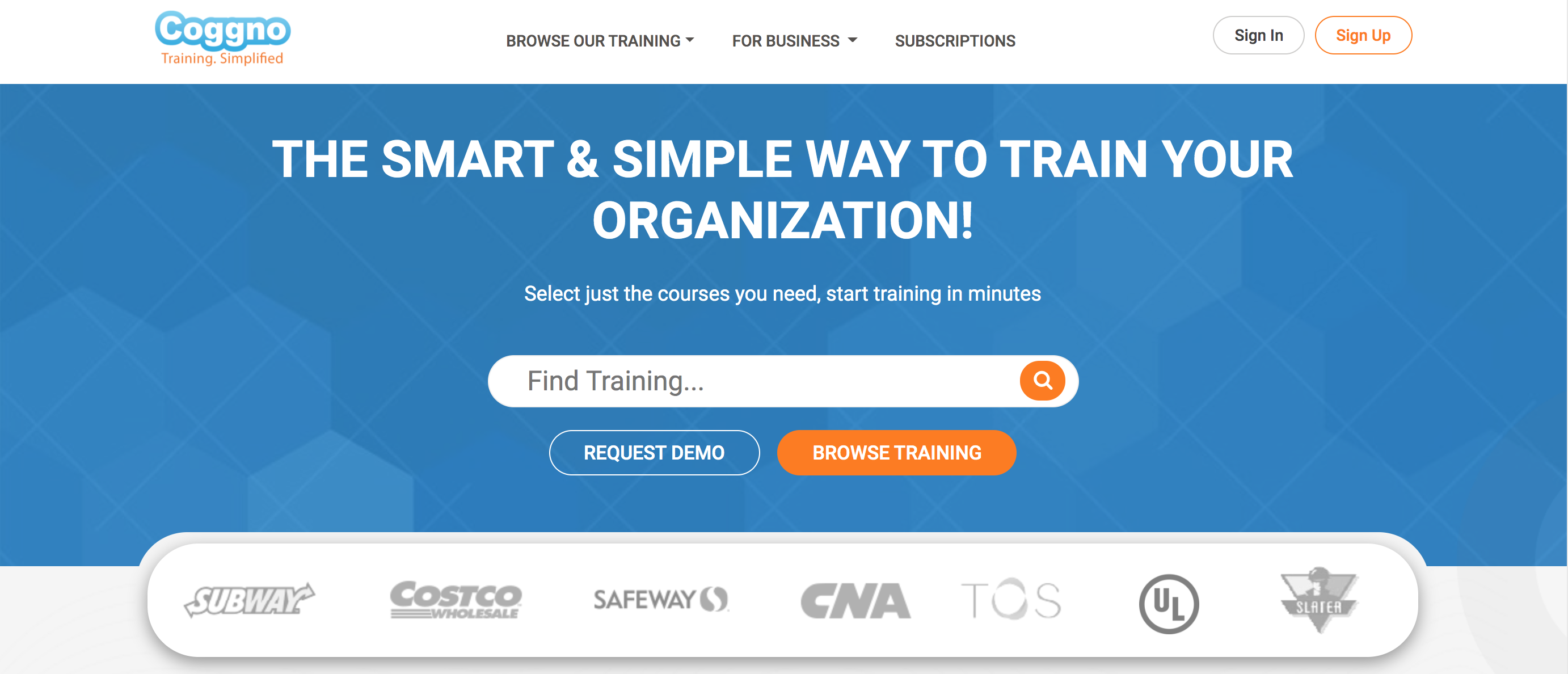 Alexa Global Traffic Rank: ~660,000
Alexa Global Traffic Rank: ~660,000
Despite the website's shockingly bad UI, this is actually quite a successful marketplace! It is alleged that some 2 million students are on the Coggno platform, although the site's low Alexa rank does cast some doubt on this figure.
Unlike the other marketplaces, Coggno is also an LMS. This means that it is a hybrid product where you can use it for internal training purposes or setup courses on their marketplace.
Coggno benefits include:
- Rich all-in-one feature-set (since it is fundamentally an elearning LMS), including landing page customization, progress monitoring, and certification
- SCORM compliant
- You simultaneously get your own website and an entry on the Coggno marketplace
Coggno Instructor Payments
- Instructors pay $35/month for the LMS
- For sales on the instructor website, instructors receive 80%-92% profits
- For sales on the Coggno marketplace, instructors receive 60% of the profits
Honorable Mentions
A few online course marketplaces to consider that don't quite have the volume to make the top 4 yet, but which might still be worth checking out:
Niche Marketplaces
For those with specific skills, it might also be worth looking at these niche sites:
Coding
- egghead.io
- Makerpad
- Codecademy note that they are a little different in that employees create their courses
Marketing CXL Institute
Design Phlearn Creative Live
Compliance 360 Training
Prestigious Marketplaces (e.g. Coursera)
Note that so far I've deliberately not mentioned some of the big names you might already be familiar with such as Coursera or Khan Academy. This is because many of these have Udemy alternatives have a barrier to entry that many Udemy instructors will not be able to meet:
- Coursera: Requires you to be an instructor at a world-class university. Typically, there are free courses with the ability to "audit" them for a fee.
- Udacity: Requires a detailed application, 5+ years of experience, and commitment to 15-20 hours per week. You need to ensure you are applying to teach a subject of interest
- Pluralsight (formerly Lynda.com) requires "short audition video" and generally is quite selective, although if you are knowledgable about a particular technical niche you should give it a shot.
- LinkedIn Learning
- Learning.ly - similar to Pluralsight, these guys expect at least one of the following (1) Field experience (2) Awards or distinctions or (3) Track record of presenting at important industry events
Note that if you do qualify for any of the above, and are able to meet the high quality bar that most of them set, they can be a great option.
To give you a feel for their size:
- Pluralsight has 6500+ courses
- LinkedIn Learning: With more than 5,000 courses
These online learning platforms do tend to pay authors more (although this is subject to factors such as the amount of time students spend on an author's course)
Understanding Udemy Terms and Conditions
A common question from Udemy instructors looking around at alternatives is "Am I allowed to put my course on another marketplace?" The answer is yes, as you can see from this support answer
Udemy's marketplace model means that when you publish a course on our platform, you retain all the rights to your content
Note that this is a little different if your course is part of the more selective "Udemy for Business" program. If this is the case, then if you want to sell your course on another marketplace you need to "terminate your participation in the Udemy for Business Program" (which you can do at any time). The key thing to note is that the terms and conditions say:
Udemy will remove your courses from the Collection within 12 months of termination
Which is deliberately vague. In theory, this means that you are obliged not to sell your course on another marketplace for up to 12 months, depending on how long Udemy takes to withdraw the course.
Crucially, for Udemy for Business authors, there are no restrictions on selling on your own platform.
In section 2.4 of the Udemy Promotions Policy it states:
Once your course is included in the Collection, you agree that you will not begin to offer any pre-recorded courses that directly compete with or injure the sales of that course on any site or platform other than your own
Note the qualification "any site or platform [...] other than your own" This does give you the flexibility to offer your course on your own platform.
Here is a summary of your options:
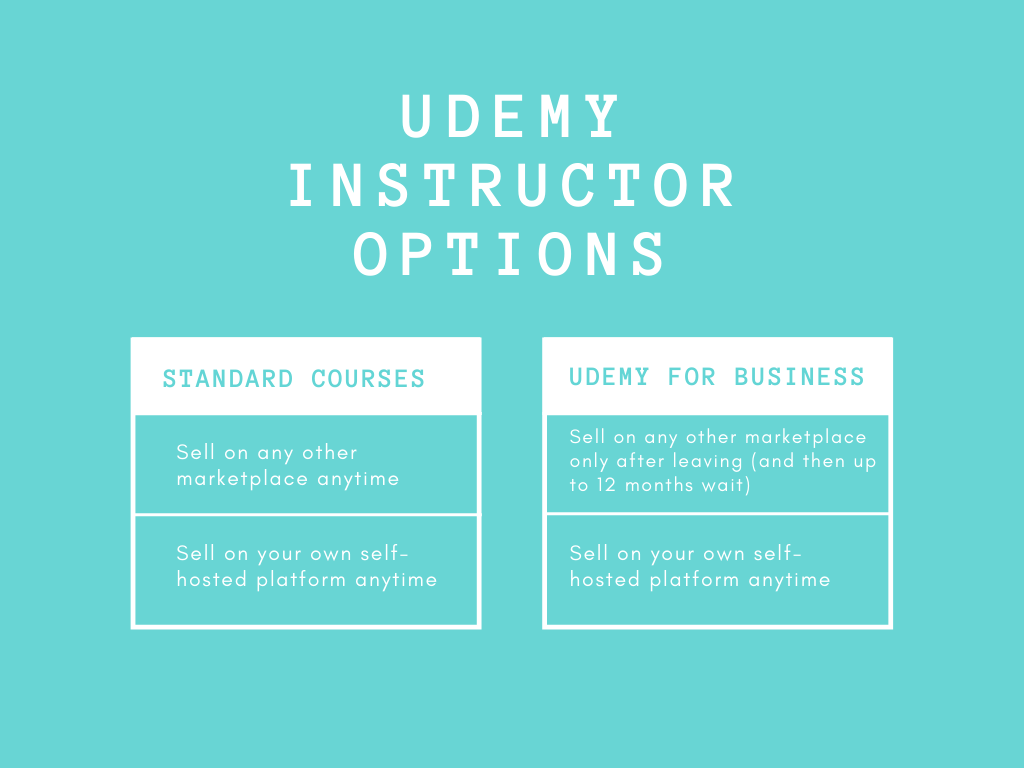
Naturally, if you opt to sell your course on alternative platforms you need to manage your pricing accordingly: Students will not be delighted to discover they could have got your course cheaper on a different marketplace - these are the unwritten rules of ecommerce.
Sell on your own site vs. another marketplace

Broadly speaking, there are two main types of online learning platforms:
- Other marketplaces (what we have discussed so far)
- Self-hosted sites
A Google search will reveal many options for online course self-hosting such as:
- Teachable
- Thinkific
- Kajabi
- Podia
- CourseMaker
- Various open-source LMS projects and WordPress plugins
With any of these online course builder options, there are a lot of new things to consider:
- transaction & hosting fees
- membership sites
- setting up payments (e.g. with Stripe or Paypal)
- optimizing sales pages
- running webinars
- marketing - particularly content and email marketing as well as social media
In short, you have to "go it alone". Whilst taking this path to sell online courses means the burden of the marketing falls on you, this can be a really powerful way to take full control of your online course business and course creation process.
We have detailed posts explaining:
- How to choose whether or not to use an online course platform or go with a marketplace
- Your options for self-hosting
Which Marketplace Is Right For You?
If you have 5+ years of relevant industry experience and/or a track record in an in-demand field, it might be worth giving the more selective platforms (Pluralsight, Udacity, Linkedin Learning) a shot. For those working in universities, Coursera or EdX might be an option.
For course creators looking to easily replicate existing Udemy success, the best alternative place to sell courses is Skillshare, with Edureka and Skillwise also worthy of consideration. If you're in a more niche field, or you worry that the existing competition is too entrenched, some of the smaller players listed above might be better options.
If you are more entrepreneurial, then setting up your own course website could be your best bet.
Wishing you success!
